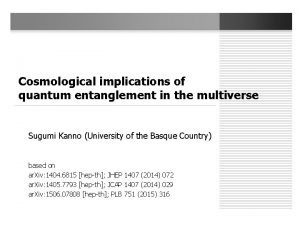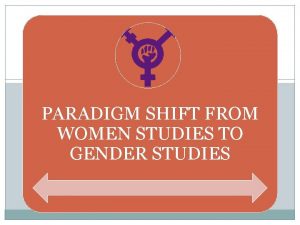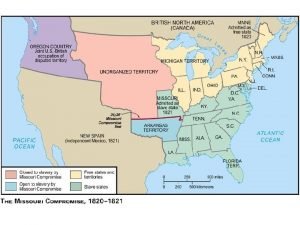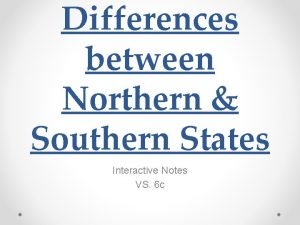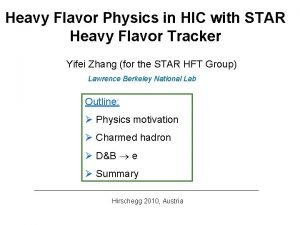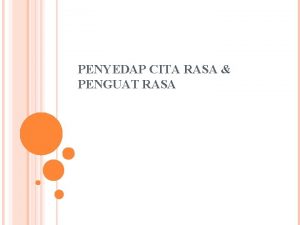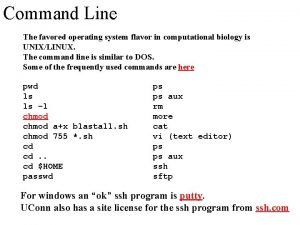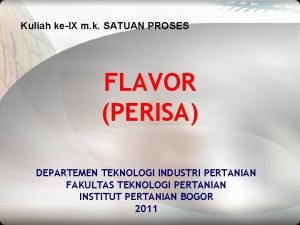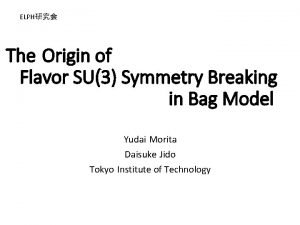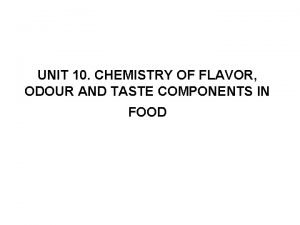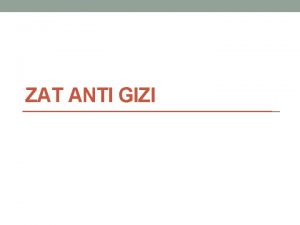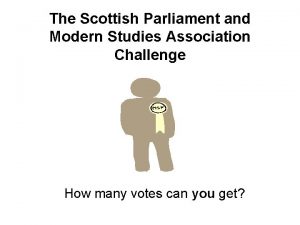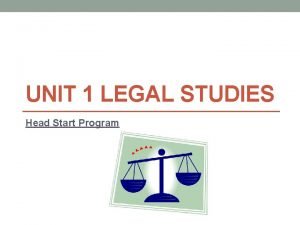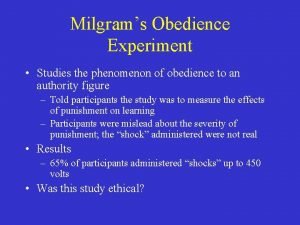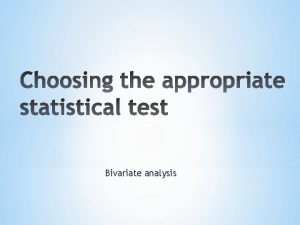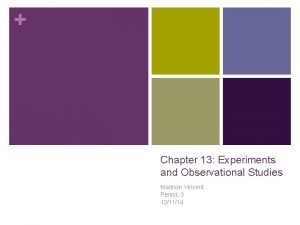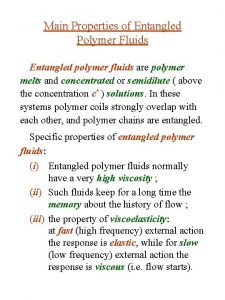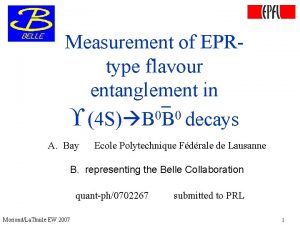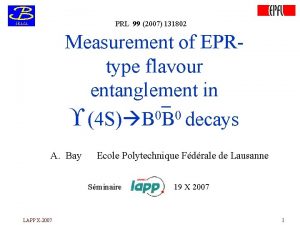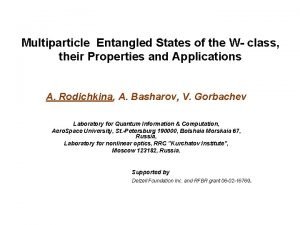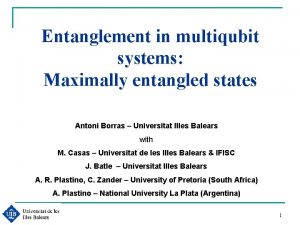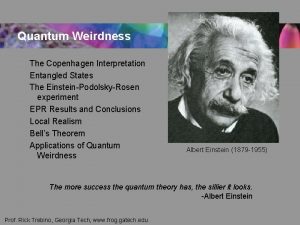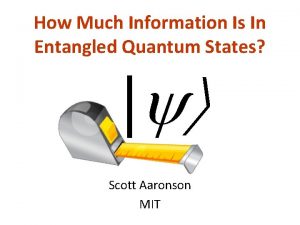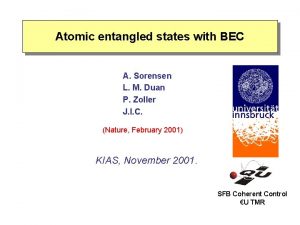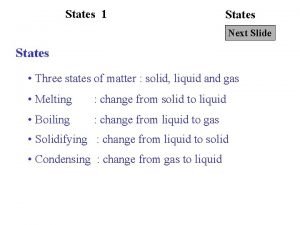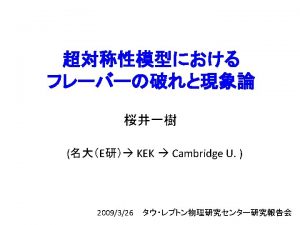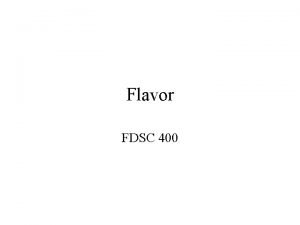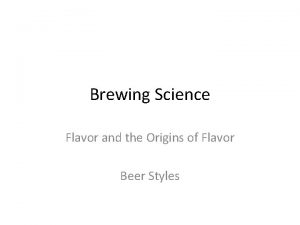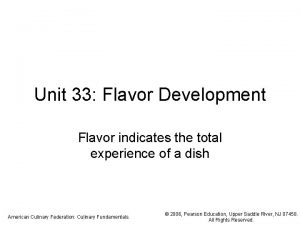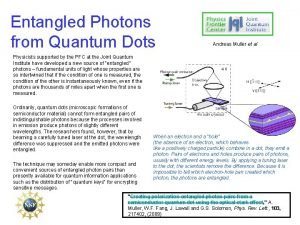Studies of EPRtype flavor entangled states in Y4












































- Slides: 44

Studies of EPR-type flavor entangled states in Y(4 s)->B 0 B 0 We want to provide a Time Dependent Asymmetry (TDA) fully corrected for experimental effects (background, wrong tags, resolution) to test alternative models to QM. AQM(Dt)=cos(Dmd Dt) AB 17 -Feb-06 1

Steps of this analysis 1) 2) 3) 4) 5) 6) 7) 8) selection of the events background subtraction correction for wrong tag events data deconvolution checks - 5. 1 OF+SF=B 0 lifetime - 5. 2 second analysis with selection on Dz resolution 6) comparison with models MC heavily needed to do the subtractions/corrections of point 1 to 3 and to produce the deconvolution matrices! AB 17 -Feb-06 2

Selection of D*ln events and tagging "B 0 side": B 0 D* l n D* D 0 + slow pion D 0 Kp Kpp 0 K 3 p The used particles are then discarded and the remaining particles are the ”Tag side". These remaining particles are sent to standard BELLE procedure to tag the B 0 flavour. We select only the lepon tagged subset with highest purity parameter r>0. 875. AB 17 -Feb-06 3

Event selection summary AB 17 -Feb-06 4

EVENT SELECTION : A few plots. . . Plepton in cms K, p momenta for D 0 K p Data distributions shown are obtained with all the “other” cuts applied MC pre-analysis cut MC AB 17 -Feb-06 5

A few plots. . . Momenta for K 3 p shifted in opposite direction (vertex fit ? ) ± 0. 1 Ge. V MC-data relative uncertainty AB 17 -Feb-06 6

A few plots. . . M(D 0) and M(D*)-M(D 0) MC shifted by ~0. 12 Me. V Data width larger by 0. 14 Me. V M(D*)-M(D 0) AB 17 -Feb-06 Þadjust cuts to get equivalent configurations 7

A few plots. . . impact parameters not perfect but cuts are large. . . ± 0. 01 cm AB 17 -Feb-06 8

A few plots. . . chi 2 from vertex fit ± 1 bin = ± 5. . . AB 17 -Feb-06 9

A few plots. . . s(Vz) Errors from vtx fit do not agree. AB 17 -Feb-06 from vertex fit Artificially rescaled by 1. 125 N. B. : s(Vz) cut only used in control analysis ± with “high resolution” 2 bin = ± 0. 002 cm 10

A few plots. . . cos(q. B, D*l) Fit using MC shapes: D*ln B 0 D**ln B± D 0**ln AB 17 -Feb-06 cut: |cos(q. B, D*l)|<1. 1 11

Background subtraction Wrong tag evts correction 1. - Continuum 2. analyzed 8. 3 1/fb of off resonance data => 0 evts 3. Fake D* 4. Wrong D* lepton combinations 5. B± to D 0** 6. Wrong tags AB 17 -Feb-06 12

Raw time dependent asymmetry Asymmetry 1 After event selection stat syst 0 Background subtracted -1 0 AB 17 -Feb-06 4 8 12 16 20 ps 13

Fake D* control sideband nominal sideband From sideband : background evts 126± 6 and 54± 4 OF and SF Control sideband 128± 6 and 54± 4 AB 17 -Feb-06 14

Fake D* from sideband control sideband MC truth Effect on the asymmetry data with systematics AB 17 -Feb-06 False D* and/or false slow pion change distributions by 1 sigma + move cuts 15

Wrong D*-lepton combinations Reversed lepton technique: in the CMS take Plepton : = - Plepton and redo the analysis 78 evts OF and 237 SF Effect on the asymmetry data with systematics AB 17 -Feb-06 main effect from large number of SF. . . change distributions by 1 sigma + move cuts 16

Wrong D*-lepton combinations Reversed lepton technique: method check with MC events reversed lepton MC truth prediction from MC: 20 evts OF and 200 SF consistent with data AB 17 -Feb-06 17

Background subtraction B± Fit using MC shapes: D*ln B 0 D**ln B± D 0**ln shapes ~identical ! - Need to correct only for B±, because B 0 has mixing -MC gives relative efficiency -Assume MC BRs ratio. . . Systematics: ~8% from fit ± 0 0 AB 17 -Feb-06 ~20% from BR(Y B D **)/BR(Y B D**) 18

Background subtraction B± MC normalized 254 OF 1 SF Systematics: ~8% from fit ± 0 0 AB 17 -Feb-06 ~20% from BR(Y B D **)/BR(Y B D**) 19

Wrong tag correction High purity events: MC predicts 0. 015± 0. 001(stat) Similar analysis (Phys. Rev. D 71 2005) gives 0. 020± 0. 005 We consider 0. 015± 0. 005. Expect (1 -2 w)-1 = 1. 033± 0. 010 attenuation of the TDA Systematics: ± 0. 010 ± 1 sigma in corrections ~3% attenuation double counting. . . AB 17 -Feb-06 20

Construction of the raw TDA AB 17 -Feb-06 21

Raw time dependent asymmetry Asymmetry 1 After event selection stat syst 0 Background subtracted -1 0 AB 17 -Feb-06 4 8 12 16 20 ps 22

Data deconvolution (see appendix A) Data correction is done by a program based on a Singular Value Decomposition (SVD) of the deconvolution matrices. The matrices are constructed from a MC set of events which are supposed to reproduce detector effects. Problems: 1) MC is not perfect (main problem: reproduction of Dz resolution 2) (we add an extra smearing of 46 ± 40 mm) 2) Unfolding contains regularization/filtering to get rid of elements which are statistically non significant, with the MC shapes used as a priori => can discard Data information 3) We have MC events generated only with QM hypothesis, given DM, B 0 lifetime (solution: mix OF and SF sets) AB 17 -Feb-06 23

Corrected time dependent asymmetry QM for QM we use fitted value Dmd = 0. 503 1012 h/s AB 17 -Feb-06 24

Discussion on systematic errors Sytematic errors on the TDA can originate from 1) errors in background subtraction (in the note) 2) intrinsic behaviour of deconvolution procedure (appendix A) 3) imprecision of the Belle full MC (note and appendix B) 2) will be discussed next presentation AB 17 -Feb-06 25

Systematics: selection, bckgrd, wrong tag cuts (appendix B) M(D*)-M(D 0) cos(q. B, D*l) AB 17 -Feb-06 ± 1 s variation in SF/OF distrib M(D*)-M(D 0) different sidebands w = 1. 5± 0. 5% Þ ± 1 % ± 1 s variation in SF/OF distrib fit errors in B± fraction and BRs ratio 26

Method used to get systematic errors in evt selection for each observable X 1) we first estimate D-MC relative precision on X then, in a way which should reduce the effect of statistical fluctuations 2) we evaluate syst. error from the integrated asymmetry distribution as a function of X AB 17 -Feb-06 27

± 5 Exemple: slow pion vertex chi 2 Asymmetry vs chi 2 linear fit AB 17 -Feb-06 Dt>3 ps 28

Exemple: slow pion chi 2 comparison DATA & MC Dt>3 ps data Dt>3 ps MC AB 17 -Feb-06 29

Error estimates (~low Dt) total ± 0. 001 AB 17 -Feb-06 30

Error estimates (Dt>3 ps) total ± 0. 005 AB 17 -Feb-06 our choice of syst errors: 0 -1 ps ± 0. 001 1 -6 ps ± 0. 005 6 -20 ps ± 0. 010 31

Analysis Checks AB 17 -Feb-06 32

Alternative analysis with s(Vz)<0. 01 cm Select events with better resolution in Dz => deconvolution procedure has less to do. . . AB 17 -Feb-06 rescale by 1. 125 33

Alternative analysis with s(Vz)<0. 01 cm Dt>3 ps syst errors: AB 17 -Feb-06 0 -1 ps ± 0. 003 1 -6 ps ± 0. 019 6 -20 ps ± 0. 04 34

Analysis with s(Vz)<0. 01 cm N of events reduced by ~18% s(Vz)<0. 01 Errors shown are ~ unfolding d[s(Vz)] AB 17 -Feb-06 35

Other control: B 0 lifetime Plot of Deconvoluted(SF) + Deconvoluted(OF) fit: 1. 532± 0. 017 ps AB 17 -Feb-06 36

Results 1 c 2=5/11 bins for QM we use pre-BABAR&Belle Dmd = 0. 495± 0. 013 1012 h/s AB 17 -Feb-06 37

Results 2 LR c 2=74/11 bins SD c 2=229/11 bins Using pre-BABAR&Belle Dmd = 0. 495± 0. 013 1012 h/s AB 17 -Feb-06 38

Results 3 Let free Dmd QM: Dmd = 0. 503± 0. 010(stat) LR : Dmd = 0. 434± 0. 009(stat) SD : Dmd = 0. 400± 0. 010(stat) c 2 = 5/11 bins c 2 = 25/11 bins c 2 = 111/11 bins to be compared with pre-BABAR&Belle Dmd = 0. 495± 0. 013 1012 h/s AB 17 -Feb-06 39

Results 4 Possible contamination of QM events by a fraction l of SD i. e. Data = (1 -l)QM + l. SD gives l=0. 028± 0. 063 => compatibe with zero AB 17 -Feb-06 40

Deconvolution Goal: get resolution corrected data. Constraint: we need to be fair with a “large” class of theoretical models. Studied with a toy MC with parametrized resolution in Dz Set of 400 runs, each run consists of: Generation of ~35000 "MC" events based on QM Generation of ~7000 "Data" events based on QM or LR or SD Production of the 2 unfolding matrices for SF, OF events from "MC" Deconvolution of the "Data" independently for the SF and OF subsets 1) Main problem: need to populate event region where QM does not produce events, ex: SF~0 when Dt~0. Trick: add some OF ! 2) Some residual systematic effects observed. Add correction and get systematic errors. AB 17 -Feb-06 41

Deviations wrt generated model stat QM syst from deconvolution LR SD AB 17 -Feb-06 42

Sensitivity to models Generated: QM LR (analysis errors not included) lambda from fit SD chi 2/11 AB 17 -Feb-06 lambda generated 43

Results QM: chi 2 = 5 for 11 bins LR: 112 " SD: 330 " lambda = 0. 02± 0. 05 AB 17 -Feb-06 44
 Don't get entangled in civilian affairs
Don't get entangled in civilian affairs 3002001030
3002001030 Paradigm shift from women studies to gender studies
Paradigm shift from women studies to gender studies 11 free states
11 free states Southern states vs northern states
Southern states vs northern states How does the constitution guard against tyranny
How does the constitution guard against tyranny Off-flavors
Off-flavors Ageusia pronunciation
Ageusia pronunciation Does salt lose its flavor
Does salt lose its flavor Chapter 10 lipids nature's flavor enhancers
Chapter 10 lipids nature's flavor enhancers What is umami
What is umami Komponen non gizi jenis zat warna dan flavor terdiri dari
Komponen non gizi jenis zat warna dan flavor terdiri dari Taste vs flavor
Taste vs flavor Charm mesom
Charm mesom Pengertian penyedap rasa
Pengertian penyedap rasa Fema gras certification
Fema gras certification Flavor pyramid
Flavor pyramid Operating system flavor
Operating system flavor Contoh flavor enhancer
Contoh flavor enhancer Contoh flavor sintetis
Contoh flavor sintetis Su(3) flavor symmetry
Su(3) flavor symmetry Cocktail flavor wheel
Cocktail flavor wheel Taste vs flavor
Taste vs flavor Zat anti gizi
Zat anti gizi Va studies 4th grade sol review
Va studies 4th grade sol review Illinois medical studies act
Illinois medical studies act Social studies terminology
Social studies terminology Ucps program of studies
Ucps program of studies Modern studies association
Modern studies association American studies definition
American studies definition Eduqas a level film studies
Eduqas a level film studies Nys social studies inquiries
Nys social studies inquiries Define ibogaine
Define ibogaine Jane jacobs columbia university school of general studies
Jane jacobs columbia university school of general studies Sumaltriptan
Sumaltriptan Legal studies unit 1
Legal studies unit 1 Who studied the juke family tree
Who studied the juke family tree The obedience study
The obedience study Sqa scottish studies
Sqa scottish studies Use of bivariate analysis
Use of bivariate analysis Strands of social studies
Strands of social studies Advanced certificate management studies
Advanced certificate management studies Time change and continuity
Time change and continuity Classification of epidemiological studies
Classification of epidemiological studies Chapter 13 experiments and observational studies
Chapter 13 experiments and observational studies

